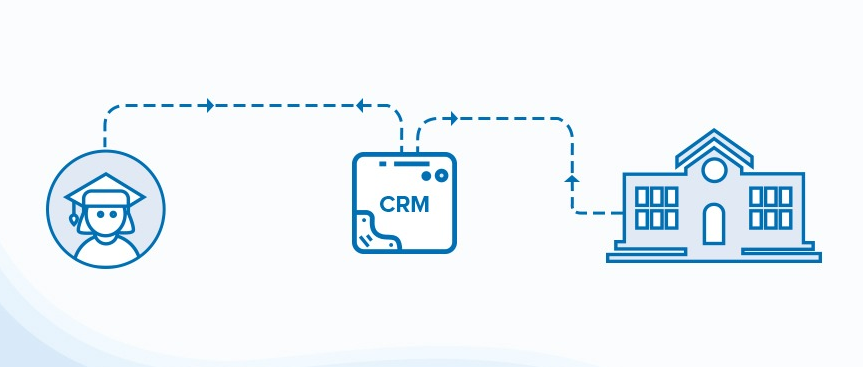.Best CRM Solutions for Educational Institutions In today’s fast-paced educational landscape, managing relationships with students, parents, and alumni is crucial. Customer Relationship Management (CRM) solutions tailored for educational institutions provide a comprehensive way to enhance communication, streamline operations, and boost overall student satisfaction. Let’s dive into the world of CRM and explore the best solutions available for educational institutions.
Understanding CRM for Education
A CRM, or Customer Relationship Management system, is designed to manage an organization’s interactions with current and potential customers. In the context of educational institutions, this means managing interactions with students, parents, alumni, and staff. CRMs help institutions keep track of these interactions, streamline administrative processes, and provide better service.

Key Features of an Educational CRM
Educational CRMs come with a variety of features tailored to meet the unique needs of schools and universities:
- Student Management: Track student progress, attendance, and performance.
- Communication Tools: Facilitate effective communication between the institution and its stakeholders.
- Admissions and Enrollment: Manage the admissions process from application to enrollment.
- Data Analytics: Provide insights through data analysis to make informed decisions.
- Integration Capabilities: Integrate with other systems like learning management systems (LMS) and student information systems (SIS).
Top CRM Solutions for Educational Institutions
There are several CRM solutions specifically designed for the education sector. Here are the top ones:
Salesforce Education Cloud
Salesforce Education Cloud is a powerful CRM solution that offers a range of features tailored for educational institutions.
- Key Features: Student lifecycle management, alumni engagement, fundraising, and data analytics.
- Pros: Highly customizable, robust integrations, excellent support.
- Cons: Expensive, steep learning curve.
- User Feedback: Users praise its comprehensive features but note the high cost and complexity.
Blackbaud CRM
Blackbaud CRM is designed for educational institutions focusing on fundraising and alumni management.
- Key Features: Fundraising management, alumni tracking, event management, reporting.
- Pros: Excellent for fundraising, user-friendly, good customer support.
- Cons: Limited in non-fundraising features, high cost.
- User Feedback: Users appreciate its fundraising capabilities but wish for more diverse features.
Ellucian CRM
Ellucian CRM is a comprehensive solution for higher education institutions.
- Key Features: Student recruitment, retention, and advancement, academic advising, and analytics.
- Pros: Tailored for higher education, strong support community, effective recruitment tools.
- Cons: Can be pricey, requires training.
- User Feedback: Users find it highly effective for recruitment but mention it requires substantial training.
HubSpot for Education
HubSpot offers a versatile CRM that can be adapted for educational purposes.
- Key Features: Marketing automation, communication tools, analytics, customizable dashboards.
- Pros: User-friendly, affordable, great for marketing and communication.
- Cons: Less tailored for education, limited in-depth features.
- User Feedback: Users love its ease of use and affordability but feel it needs more educational features.
Slate by Technolutions
Slate is a dedicated CRM for admissions and enrollment management.
- Key Features: Application management, event scheduling, communication tools, analytics.
- Pros: Excellent for admissions, highly customizable, strong analytics.
- Cons: Focused mainly on admissions, can be complex to set up.
- User Feedback: Users highly rate its admissions capabilities but note the initial setup complexity.
How to Choose the Right CRM for Your Institution
Choosing the right CRM involves several considerations:
- Assessing Your Needs: Determine what features are essential for your institution.
- Budget Considerations: Ensure the CRM fits within your financial constraints.
- Scalability and Future-Proofing: Choose a CRM that can grow with your institution.
- User Training and Support: Consider the training and support offered by the CRM provider.
Implementation Tips
Successfully implementing a CRM requires careful planning:
- Planning and Preparation: Define your goals and create a detailed plan.
- Data Migration: Ensure smooth migration of data from existing systems.
- Training Staff: Provide comprehensive training to ensure staff are comfortable using the new system.
- Monitoring and Evaluation: Regularly monitor the system’s performance and make necessary adjustments.
Benefits of Using a CRM in Education
Implementing a CRM in an educational institution offers numerous benefits:
- Improved Communication: Facilitates better communication with students, parents, and alumni.
- Enhanced Student Experience: Personalizes interactions and support.
- Streamlined Operations: Automates administrative tasks, freeing up staff time.
- Better Data Management: Provides comprehensive data analysis for informed decision-making.
Challenges and Solutions
While implementing a CRM can be challenging, these solutions can help:
- Common Challenges: Resistance to change, data migration issues, high costs.
- How to Overcome Them: Provide adequate training, plan data migration carefully, and budget effectively.
Case Studies of Successful CRM Implementations
Example 1: A university improved its admissions process and increased student enrollment by 20% using Salesforce Education Cloud.
Example 2: A college boosted its fundraising efforts by 30% with Blackbaud CRM.
Example 3: An institution streamlined its student communication and support services with HubSpot.
Conclusion
Choosing the best CRM solution for your educational institution can significantly enhance communication, streamline operations, and improve the overall student experience. By carefully assessing your needs and considering the features and benefits of each CRM, you can make an informed decision that will benefit your institution for years to come.
FAQs
-
What is the primary purpose of a CRM in education? The primary purpose of a CRM in education is to manage relationships and interactions with students, parents, alumni, and staff to enhance communication and streamline operations.
-
How can a CRM improve the admissions process? A CRM can automate and manage the entire admissions process, from application to enrollment, making it more efficient and user-friendly.
-
Are there affordable CRM options for smaller institutions? Yes, there are affordable CRM options like HubSpot that can be tailored to meet the needs of smaller institutions.
-
What are the key features to look for in an educational CRM? Key features include student management, communication tools, admissions and enrollment management, data analytics, and integration capabilities.
-
How long does it take to implement a CRM in an educational institution? The implementation time can vary but typically takes a few months, including planning, data migration, training, and evaluation.